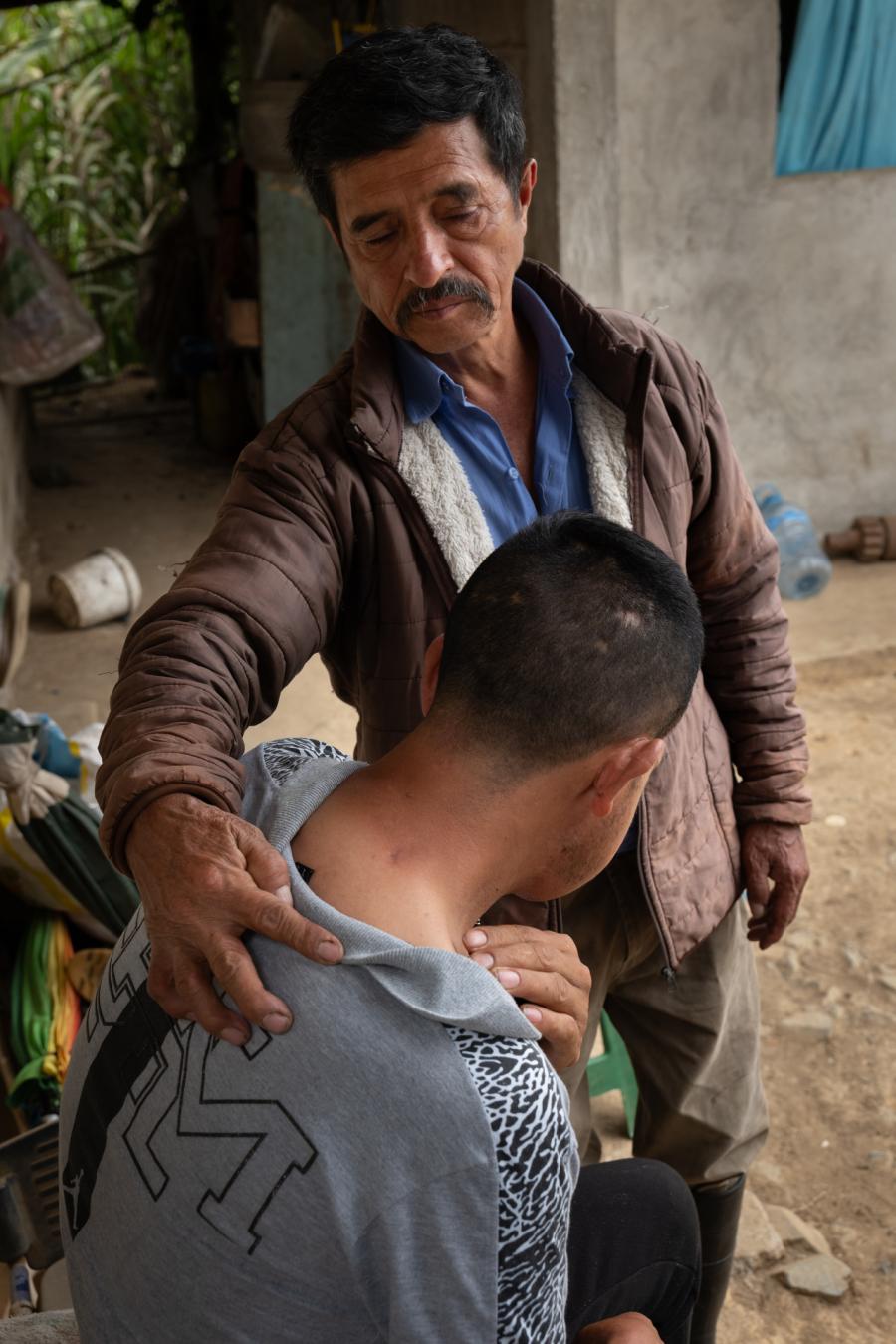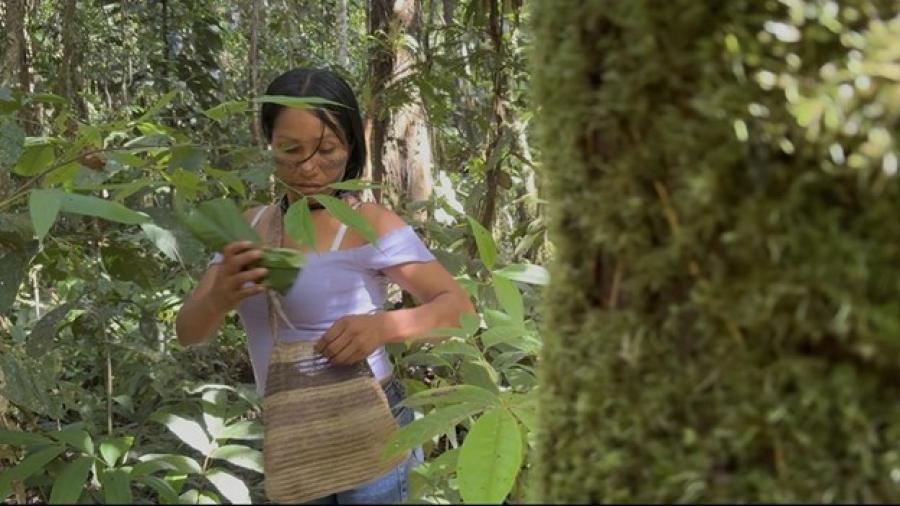The indigenous uprisings during the Festival of Inti Raymi in 1990 and 1994 exposed a weakly masked ideological project: the 19th century liberal construction of a project to convert the Indian subject to a white-mestizo citizen. This underlying liberal ideology in Ecuador saw the "Indian" as a passive and animalized `other' that must be liberated. When the "peculiar character of the Indian has been modified," as liberal theorist Abelardo Moncayo wrote at the turn of the century, "one can achieve Ecuadorian citizenship."
The massive movement of indigenous peoples during the last 25 years has dissolved this ideology which was once an important part of the political system. In addition, indigenous resurgence has contributed to the disintegration (initiated in recent decades from various sides: the developing State, the agrarian reform, the urban migration, indigenous organizations) of the "Indian object." This Indian was to receive a "token" Ecuadorian citizenship but was still deprived of recognition, without legality or legitimacy, and would still require political mediators. In reality, a political shift has occurred, the model and formation of white-mestizo citizenship, elaborated by the national State and civil society, have been thrown into question.
In this sense, recent changes in Ecuador's democratic transition have been substantial. The relationship between indigenous peoples and the State political system is completely distinct today from what it was in the past, despite the short term results of recent ethnic conflict in Ecuador. According to Andrés Guerrero, the "Confederation of Indigenous Nationalities of Ecuador, CONAIE, is not merely a new apparatus of mediation and function of the Ecuadorian Federation of Indians (FEI is an indigenous organization that served, through the Spanish speaking mestizo population, to channel demands of the indigenous population within the national political context). CONAlE and the current indigenous organizations are not simply mediating instruments tot neocolonial political subjects." This fact, adds Guerrero, is demonstrated in the acts of mobilizing, organizing, and sustaining large indigenous movements, autonomous from political parties and labor unions. This movement has created a new social agent, linking and promoting demands previously unheard of and unmentionable: a reinterpretation of history from the indigenous point of view, articulated with demands of autonomy, self-government, and self-determination.
The indigenous masses have abandoned the patterns of national history and cleared a space for new kinds of struggles. Particularly, the national indigenous uprisings in 1990 and 1994, and the regional uprisings during the same period, have forced the State into an unforeseen political practice. This new practice is replete with recently created symbols and expansive spaces in the political system: dialogue and direct negotiation between citizens who demand recognition of their ethnic collectivity as indigenous peoples, and the citizen-elites of the white-mestizo government (in the case of the regimes of Rodrigo Borja in 1990 and 1992, and Sixto Durán Ballén in 1994).
The indigenous uprisings of the 1990s, and the construction of a unique and recognized indigenous discourse have exposed and widened the cracks and fissures in Ecuador's goals of modernity, civilization, and progress built on exclusion of Ecuador's "other." In essence, the demands of indigenous organizations imply a radical reform of the nation-State, as expressed by Luís Macas (see previous article).
In this context, the disintegration of local power, the historical formation formerly in charge of the semi-private administration of the indigenous population, has generated a power vacuum in the rural areas at the county and parish levels. In contrast to what occurred until the 1960s, the hacienda owners today no longer govern indigenous subjects on plantations, rather, as efficient capitalists, they manage a salaried work force. In addition, the loose instrument of power (hacienda, Church, state officials, private inter-ethnic ties) once ruled by the hacienda, no longer reigns supreme.
Community relations between white-mestizos and indigenous people has been secularized in many ways. These relations are no longer restricted to the private and daily life, nor restricted to regional politics. When these ties exist (in many communities they have disappeared), economic and symbolic ethnic relations appear more and more as simple contractual ties. Hence secularization develops in the form of anonymous labor or mercantile exchanges.
The oil-led growth and "modernization" of Ecuador has paralleled the disintegration of this local-state infrastructure that functioned as a hinge between the central State and the indigenous population. State-led development projects and instruments treated the indigenous peoples of Ecuador not as neocolonial subjects or a mass of population needing a system of administration, but rather as agents of production, as peasants. This situation has had tangible repercussions in recent decades, the indigenous peoples (free communities, cooperative ex-huasipungueros, or indigenous peasants, and urban Indians) have become more autonomous. Indians are reaffirming and reinventing their identity and establishing for the first time a direct mediating position with the State. This affirmation entails at least two aspects: it implies a reduction in white-mestizo power and population in rural areas and communities, and a broad process of indigenous organization.
The seats of power were abandoned in Ecuador's countryside as the local white "ethnic administration" disintegrated. The seats have been rapidly filled in various ways and through various economic, symbolic, and political strategies. The indigenous communities and their cabildos have reinvented the huge festivals that were once presided over by hacienda patrones. They have fortified and increased their communal territories, pushing limits onto former haciendas now taken over after long, local struggles. A number of higher level political groupings have appeared that organize cabildos into regional federations and national organizations (Ecuarunari, CONFENAIE, CONAlE). According to Andrés Guerrero, these have surpassed the mere function of a supra-regional political presence and have presented a serious challenge to the symbolic power of the nation-State.
It's no coincidence that, as the indigenous movement has raised the flags of resurgence, the governments of Ecuador, especially from 1982 to 1997, have been obligated to make a few legal adjustments. For example, the partial reform of Article 1 of the Constitution, in which the "pluri-cultural" not "plurinational" definition of the State has been recognized. Likewise, an Office of Indigenous Affairs was created in 1993, which was linked to Ecuador's legislative branch. Also, there was an attempt to create an Ethnic Ministry near the end of 1996, during the government of the deposed Bucaram. It appears that the motives of these hurried measures of the State are trying to balance the need to respond to indigenous demands, as well as to diminish the organizing force of indigenous organizations.
Nonetheless, it is symptomatic that the State is avoiding, at all costs (as is public opinion), debating the political reorganization of the country, even when talking of decentralization. Even more interesting is that neither lawmakers nor intellectuals (some of them sincerely preoccupied with the need to theorize a scientific reorganization) seriously consider ethnicity as a relevant variable for the process of territorial organization and decentralization. Moreover, when demands for the formation of ethnic political entities were proposed, within the confines of the National State, lawmakers ignored and rejected them.
Bibliography
Almeida, José et.al. 1993. "Sismo Étnico en el Ecuador." Varias perspectivas. Quito: Cedime-Abya-Yala.
Conaghan, Catherine. 1989. "Capitalist, Technocrats and Politicians: Economic Policy-Making and Democracy in the Central Andes." In Working Paper #109. The Helen Kellog Institute, University of Notre Dame.
Guerrero, Andres. 1994. La semántica de la dominación. El concertaje de indios. Quito: Edcs. Libri Mundi.
Ibarra, Hernán. 1992. Indios y Cholos: Orígenes de la clase trabajadora ecuatoriana. Quito: Edit. El Conejo.
Isaacs, Anita. 1996. "Ecuador: Democracy Standing the Test of Time?" In Constructing Democratic Governance: South America in the 1990s. Eds. Jorge I. Dominguez Abraham E Lowental. Baltimore: John Hopkins University Press.
Korovkin, Tanya. 1993. Los Indígenas, los campesinos y el Estado: el crecimiento del Movimiento Comunitario en la Sierra Ecuatoriana. Canada: Flacso-Universidad de Waterloo.
León, Jorge. 1994. De Campesinos a Ciudadanos diferentes. Quito: Cedime-Abya Yala.
Macas, Luís, et.al. 1992. Indios. Quito: Ildis-Abya Yala. 2da. Edición.
Malloy, James y Abugattas, Luís. 1990. "Business and the Boys. The Politics of Neoliberalism in the Central Andes." Latin American Research Review. Vol. XXV, no. 2.
Menéndez, Carrión. 1994. "Ciudadanía." In `Léxico Político Ecuatoriano. Quito: Ildis.
Rosero, Fernando. 1990. Levantamiento Indígena, tierra y precios. Quito: Cedis.
Wray, Alberto et.al. 1993. Derecho, pueblos indígenas y reforma del 1993 Estado. Quito: Abya Yala.
Yashar, Deborah J. 1996. "Indigenous Protest and Democracy in latin America." In Constructing Democratic Governance: South America in the 1990s. Eds. Jorge I. Dominguez & Abraham E Lowental. Baltimore: John Hopkins University Press.
Article copyright Cultural Survival, Inc.



